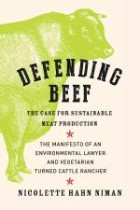Book Review of Defending Beef
- Mar 13, 2015
- 2 min read
Defending Beef—The Case for Sustainable Meat ProductionThe Manifesto of an Environmental Lawyer and Vegetarian Turned Cattle RancherBy Nicolette Hahn Niman Chelsea Green Publishing 2014 For those of you who have made a conscious decision to eat or raise sustainably produced grassfed beef, Defending Beef is a book that you can use to help educate others as to why that decision is good for the planet. I’ve read numerous articles and books about the impact of raising beef on the planet or on human health, but this book brings all the critical information into one place. Additionally, this book explains how the negative attitudes towards beef as a food and on cattle as a livestock came to pass. In turn, those stories make you realize just how much journalism, pseudo-science, political agendas, and corporate lobbying can influence such critical areas of our lives like our food system. The book is filled with surprising statistics that refute just about every negative statistic you have heard about the cattle industry at large. For me, the interesting part of Niman’s story is how she served as senior attorney for the Waterkeeper Alliance, running their campaign to reform concentrated production of livestock and poultry, so she’s done some due diligence on the negative impact that kind of production can cause. She then married Bill Niman, a rancher, and began to explore the value and importance of grassfed livestock. While this may seem like old news to some of us, there are still lots of people out there arguing that concentrated livestock production is the better route to go to make the most of agricultural lands and therefore we should be eating more pork and chicken. Niman takes this argument to task and she points out how cattle can be used to improve soil health, sequestering carbon and methane so that more climate changing gases are stored in the soil. Likewise, grassfed beef can improve the land base that could not be farmed/cropped and can increase biodiversity, wildlife habitat, and restore grasslands that have been taken over by invasive weeds and shrubs. While reading Defending Beef can be frustrating at times because the focus is only on cattle, the benefits of all grassfed livestock for both the planet and human health are transferable. Perhaps one of the most interesting statistics for me was how little beef is actually imported into the US from other countries (16%). This was good news for me in that we are actually raising most of our own beef. That means there is more opportunity to create change within this system domestically. As always, the key to that change is an informed consumer base who is actually choosing healthy beef instead of heavily processed food that are being sold as healthy because they are vegetable-based food. If we ultimately want our food choices to help us be healthy, regenerate the landscape, and provide economic opportunity for those involved in the raising of those animals, then we need to know the truth about that food and the difference that management can make. Defending Beef gives you the full story behind sustainably raised beef and allows the reader to not be pulled off course by the sound bites we are surrounded with in the mainstream media.

